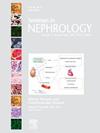求助PDF
{"title":"超越肾脏基因:肾脏病患者基因检测的广泛临床意义。","authors":"Naama Elefant, Maddalena Marasà, Hila Milo Rasouly","doi":"10.1016/j.semnephrol.2025.151660","DOIUrl":null,"url":null,"abstract":"<p><p>Genetic testing in nephrology is evolving beyond diagnosis of kidney diseases to significantly influence broader patient care. This review evaluates the expanding role of genetic information in nephrology practice. We compare various testing technologies-including targeted gene panels, exome/genome sequencing, and single nucleotide polymorphism (SNP) arrays-highlighting their clinical utility and limitations in various medical specialties. We discuss existing tests where genetic results could impact the care of patients with chronic kidney disease (CKD): management of CKD-associated comorbidities, clinical implications of American Society of Medical Genetics and Genomics actionable genes, pharmacogenomic tests to optimize medication selection and dosing, and Human Leukocyte Antigen testing. As novel genetic tools emerge, such as polygenic risk scores and clonal hematopoiesis of indeterminate potential, we discuss how they may soon be reported in clinical settings. Given the complexity of interpreting diverse genetic data, we advocate for the integration of genetics professionals into nephrology care teams. This review concludes that genetic testing beyond kidney-specific genes holds immense promise for improving the care of patients with kidney diseases, but further research is necessary to establish guidelines for its integration into nephrology practice. Semin Nephrol 36:x-xx © 20XX Elsevier Inc. All rights reserved.</p>","PeriodicalId":21756,"journal":{"name":"Seminars in nephrology","volume":" ","pages":"151660"},"PeriodicalIF":3.5000,"publicationDate":"2025-07-01","publicationTypes":"Journal Article","fieldsOfStudy":null,"isOpenAccess":false,"openAccessPdf":"","citationCount":"0","resultStr":"{\"title\":\"Beyond Kidney Genes: Broad Clinical Implications of Genetic Testing for Nephrology Patients.\",\"authors\":\"Naama Elefant, Maddalena Marasà, Hila Milo Rasouly\",\"doi\":\"10.1016/j.semnephrol.2025.151660\",\"DOIUrl\":null,\"url\":null,\"abstract\":\"<p><p>Genetic testing in nephrology is evolving beyond diagnosis of kidney diseases to significantly influence broader patient care. This review evaluates the expanding role of genetic information in nephrology practice. We compare various testing technologies-including targeted gene panels, exome/genome sequencing, and single nucleotide polymorphism (SNP) arrays-highlighting their clinical utility and limitations in various medical specialties. We discuss existing tests where genetic results could impact the care of patients with chronic kidney disease (CKD): management of CKD-associated comorbidities, clinical implications of American Society of Medical Genetics and Genomics actionable genes, pharmacogenomic tests to optimize medication selection and dosing, and Human Leukocyte Antigen testing. As novel genetic tools emerge, such as polygenic risk scores and clonal hematopoiesis of indeterminate potential, we discuss how they may soon be reported in clinical settings. Given the complexity of interpreting diverse genetic data, we advocate for the integration of genetics professionals into nephrology care teams. This review concludes that genetic testing beyond kidney-specific genes holds immense promise for improving the care of patients with kidney diseases, but further research is necessary to establish guidelines for its integration into nephrology practice. Semin Nephrol 36:x-xx © 20XX Elsevier Inc. All rights reserved.</p>\",\"PeriodicalId\":21756,\"journal\":{\"name\":\"Seminars in nephrology\",\"volume\":\" \",\"pages\":\"151660\"},\"PeriodicalIF\":3.5000,\"publicationDate\":\"2025-07-01\",\"publicationTypes\":\"Journal Article\",\"fieldsOfStudy\":null,\"isOpenAccess\":false,\"openAccessPdf\":\"\",\"citationCount\":\"0\",\"resultStr\":null,\"platform\":\"Semanticscholar\",\"paperid\":null,\"PeriodicalName\":\"Seminars in nephrology\",\"FirstCategoryId\":\"3\",\"ListUrlMain\":\"https://doi.org/10.1016/j.semnephrol.2025.151660\",\"RegionNum\":3,\"RegionCategory\":\"医学\",\"ArticlePicture\":[],\"TitleCN\":null,\"AbstractTextCN\":null,\"PMCID\":null,\"EPubDate\":\"2025/7/17 0:00:00\",\"PubModel\":\"Epub\",\"JCR\":\"Q2\",\"JCRName\":\"UROLOGY & NEPHROLOGY\",\"Score\":null,\"Total\":0}","platform":"Semanticscholar","paperid":null,"PeriodicalName":"Seminars in nephrology","FirstCategoryId":"3","ListUrlMain":"https://doi.org/10.1016/j.semnephrol.2025.151660","RegionNum":3,"RegionCategory":"医学","ArticlePicture":[],"TitleCN":null,"AbstractTextCN":null,"PMCID":null,"EPubDate":"2025/7/17 0:00:00","PubModel":"Epub","JCR":"Q2","JCRName":"UROLOGY & NEPHROLOGY","Score":null,"Total":0}
引用次数: 0
引用
批量引用

 求助内容:
求助内容: 应助结果提醒方式:
应助结果提醒方式:


